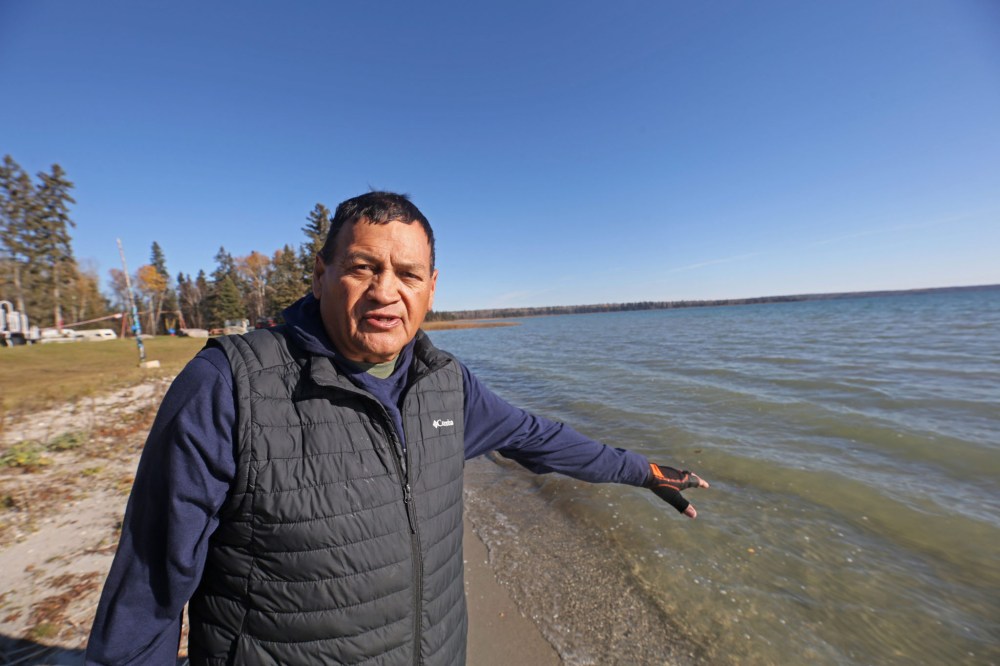Chief says he was behind legal threat over boats being allowed on Clear Lake
Advertisement
Read this article for free:
or
Already have an account? Log in here »
To continue reading, please subscribe:
Monthly Digital Subscription
$0 for the first 4 weeks*
- Enjoy unlimited reading on winnipegfreepress.com
- Read the E-Edition, our digital replica newspaper
- Access News Break, our award-winning app
- Play interactive puzzles
*No charge for 4 weeks then price increases to the regular rate of $19.00 plus GST every four weeks. Offer available to new and qualified returning subscribers only. Cancel any time.
Monthly Digital Subscription
$4.75/week*
- Enjoy unlimited reading on winnipegfreepress.com
- Read the E-Edition, our digital replica newspaper
- Access News Break, our award-winning app
- Play interactive puzzles
*Billed as $19 plus GST every four weeks. Cancel any time.
To continue reading, please subscribe:
Add Free Press access to your Brandon Sun subscription for only an additional
$1 for the first 4 weeks*
*Your next subscription payment will increase by $1.00 and you will be charged $16.99 plus GST for four weeks. After four weeks, your payment will increase to $23.99 plus GST every four weeks.
Read unlimited articles for free today:
or
Already have an account? Log in here »
CLEAR LAKE — The chief of a western Manitoba First Nation is taking responsibility for the boat ban at Clear Lake last summer, saying he threatened Parks Canada with legal action if motorboats were allowed back this year.
Chief Dwayne Sonny Blackbird of Keeseekoowenin told the Brandon Sun Friday he called an official at Riding Mountain National Park last spring and threatened to take action if boats were reintroduced.
The action came from his deep interest in the health of the lake, he said.

“It’s supposed to be protected for future generations,” Blackbird said. “And it doesn’t look like that. That’s why I’m here.”
The boat ban was issued shortly after his phone call, he said.
Parks Canada did not immediately comment on the chief’s claim when emailed on Friday. Management staff were unavailable in the agency’s administration office at Clear Lake when the Sun visited in the afternoon.
A senior Parks Canada official told a crowd of about 600 people at a town hall in Wasagaming in July that a legal threat convinced the agency its promise to reintroduce motorized boats on Clear Lake in the summer would not be viable.
Andrew Campbell, senior vice-president of operations for Parks Canada, said at the meeting the federal government was doing its “constitutional obligation to consult” with stakeholders after an unnamed party had threatened legal action.
Blackbird said he made the threat because he is inspired by a strong family history at the lake. The 2024 discovery that zebra mussels were in the lake, and the failure to contain the invasive species, charged him to action, he said.
Until the chief is satisfied there is a strong plan to manage zebra mussels in the lake, he will fight any effort to put motorboats back on the water, he said.
“I want to protect my culture and my heritage,” he said. “I’m going to fight till I’m dead.”
Last week, a judge approved Keeseekoowenin to participate as a respondent in the judicial review of the Clear Lake boat ban. It will defend the ban alongside the federal attorney general.
The judicial review was launched in June by a coalition of community groups called Fairness for Clear Lake. It includes the Clear Lake Cabin Owners’ Association, the Clear Lake Cottage Owners’ Association, the Clear Lake Country Destination Marketing Organization Inc., Collyer Construction, three numbered companies and Gary Buckley.
The group, which is the applicant in the case, is asking a judge to declare the boat ban invalid or unlawful.
As an active participant, the First Nation is positioned to submit arguments and evidence, and if the boat ban is overturned, Keeseekoowenin may be able to appeal the decision and escalate the court process, University of Manitoba law instructor Andrea Doyle said.
Blackbird said the First Nation plans to submit an affidavit in the near future.
Trevor Boquist, who represents the coalition that is seeking to get boats back on the water, said this week the group gave its support for Keeseekoowenin to join the judicial review.
“They petitioned the court to be added,” Boquist said. “We felt they should be added, given the situation. We were supportive of that.”
Keeseekoowenin applied to join the judicial review in September. Boquist said the motivation of the First Nation was still unknown.
“We aren’t sure what they are going to file,” Boquist said Monday.
While being a stakeholder with property at Clear Lake, Keeseekoowenin did not join as a member of the coalition. The First Nation wrote a letter of support for the previous boat ban in May 2024.
After forming to protest this year’s ban, Fairness for Clear Lake crowdfunded more than $115,000 and launched the judicial review. As of July, $35,000 had been spent to file the judicial review, contract a fisheries biologist and pay for public relations.
— Brandon Sun









